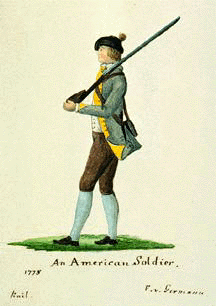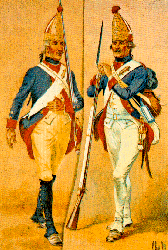|
|
|
Major Events in The American Revolution
1765 Stamp Act
A tax imposed by Britain on colonists, in which colonists would have to pay taxes on
commercial and legal papers,
newspapers, almanacs, pamphlets, cards and dice. This tax was imposed after the French and
Indian War so Britain could pay
off their expences. The colonists resisted because they felt they had already paid with
the lives of colonists who died helping in
the war. The colonists also thought it was unfair for Britain to tax them without their
say. The Stamp Act was a major turning
point leading to the war. It was the first time the colonists felt as one body separate
from Britain. The colonists seemed to be
"getting out of hand" to Britain, so they sent troops to enforce the law and
keep peace. The troops failed, and after several
confrontations, the Revolutionary War began.
April 19, 1775 Lexington and Concord
This battle was won by Major Pitcairn [British] over Joseph Warren [American]. The
Americans fought by taking hold of the
Old North Bridge and refusing to let go. That was the battle of Concord. We later lost at
Lexington when Major Pitcairn was
assisted by a fellow Englishman, General Hugh Percy. Joseph Warren died shortly after the
battle of Lexington. The battles of
Lexington and Concord were the first Battles of the Revolutionary War. These battles took
place in what is today Concord,
Mass, west of Boston.

June 17, 1775 Bunker Hill
This battle was won by Sir Thomas Gage [British] over Colonel William Prescott [American].
This is the battle at which
Colonel Prescott said, "Don't one of you fire until you see the whites of their
eyes!" The Americans didn't, and gave the British
staggering losses. Sir Thomas Gage sent two more waves of troops before we ran out of
ammunition and surrendered. The
battle of Bunker Hill took place in Charleston, Mass., north of Boston.
Sept. 25, 1775 Montreal
This battle took place in Quebec,Canada, north of New York state. It was won by Sir Guy
Carleton [British] over Brig.
General Richard Montgomery [American]. Our attack was beaten back, serving us a few
casualties.
June 28, 1776 Charleston
Colonel William Moultrie [American] won out this battle over Sir Peter Parker [British].
Colonel Moultrie built Fort Moultrie
on Sullivine's Island, which was in Charleston Harbor. Moultrie winning the battle kept
the British from fighting in the southern
states for the next two years. The battle of Charleston took place in Charleston, South
Carolina, south of Myrtle Beach.
Dec. 26, 1776 Trenton
This battle was won by [American] General Washington over German [Hessian] mercenaries
under the command of Sir Johann
Rall [British]. This battle was not a battle against British troops, but Germans, allied
with the British. Washington used his well
known sly tricks to win the battle. During the fight, Sir Rall was mortally wounded.
Trenton was fought at Princeton, New
Jersey, south of New York City.

Jan. 3, 1777 Princeton
The battle of Princeton was won by General Washington [American] over Sir Charles
Cornwallis [British]. Washington waited
until night, and left his army's campfires burning to make it seem they were asleep, while
they actually surrounded the British
forces. The Americans attacked just before sunrise. The victory raised morale of all the
troops. The battle of Princeton took
place in Princeton, New Jersey, south of New York City.
Oct. 17, 1777 Saratoga
Daniel Morgan [American] won this out over Sir John Burgoyne [British]. Daniel Morgan
ordered his troops to attack until the
British retreated. When the British did retreat, the Americans pinned them in their own
camp and surrounded them. Saratoga
took place in Saratoga, New York, just north of New York City.
June 28, 1778 Monmouth
Sir Henry Clinton [British] lost Monmouth to General Washington [American], despite a
major screw-up in the battle.
Washington ordered General Charles Lee to tell the troops, "Attack!" But Lee got
scared and ordered a retreat. Washington
had to rally the troops and send them marching back, where they fought fiercely and won.
After the battle, Lee was court
martialed and relieved of duty for two years. Monmouth was fought in Freehold, New Jersey,
north of Trenton.
Feb. 24, 1779 Vincennes
George Rogers Clark [American] won this battle over British Forces. George Clark was not a
soldier, or even in the army. He
was a frontiersman sent by Virginia to obtain land northwest of the Ohio River. Vincennes
took place in what is today
Vincennes, Indiana, south of Kokomo.
Jan. 17, 1781 Cowpens
Cowpens was won by Daniel Morgan [American] over Sir Banastre Tarleton [British]. The
Americans fought by just shooting
and shooting until Sir Tarleton had to order a retreat, and a very sloppy one at that.
This battle was named after some cow
pens that were in the middle of the battle field. Cowpens took place in Cowpens, just
north of Myrtle Beach.
March 15, 1781 Guilford Court House
The battle of Guilford Court House was won by Gen. Nathaniel Greene [American] over Sir
Charles Cornwallis [British].
When Guilford Court House was won, it ended British control of both North and South
Carolina. The battle of Guilford Court
House took place in Guilford County, North Carolina, north of Greensboro.
Oct. 14, 1781 Yorktown
Yorktown was the last battle in the Revolutionary War, and it was won by General
Washington [American] over Sir Charles
Cornwallis [British]. The Americans used all the ammunition they had and blasted the
British to make a siege 20 days long.
Cornwallis finally surrendered after his troops were exhausted and his gunpowder gone. The
siege of Yorktown was fought in
Yorktown, Virginia, east of Williamsburg.
September 3, 1783 Treaty of Paris
The treaty that ended the Revolutionary War. By its terms, America had independence and
owned the land south of Canada
and the land from the Atlantic Ocean to the Mississippi River.